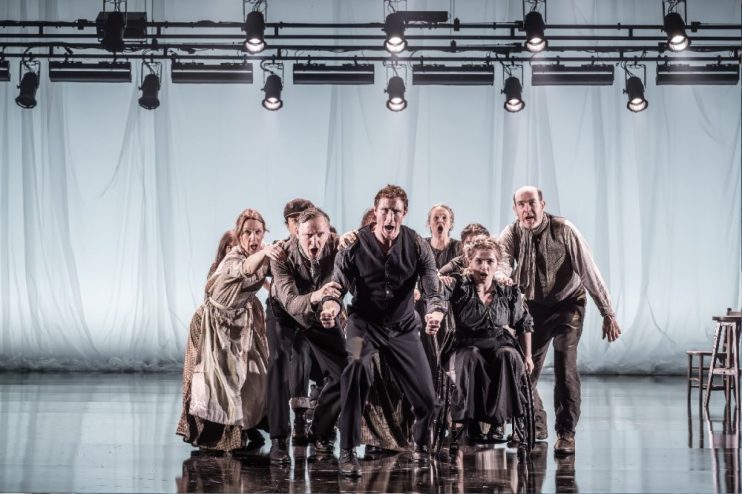London Tide review: A dirge – but what did you expect?

London Tide at the Lyttelton Theatre: ★★★★
“Every writer of fiction, though he may not adopt the dramatic form, writes in effect for the stage,” Charles Dickens announced in 1858. In the case of his particular style of fiction – lengthy, originally serialised novels crammed with characters and complex plots – this is especially fitting.
But is it fitting to lob in avant garde blues punk? Well, yes, although Dickens would surely be a little aghast at this new adaptation of his last and least popular novel, Our Mutual Friend. It introduces the disquieting music of PJ Harvey to devastating effect. Her songs, always dour and atmospheric, help transform the text into something new, doing a spectacular job of conveying emotions that would have been difficult for the characters to express without stalling the pace of the story.
Focusing on the Thames is vaguely compelling – though the play ultimately misses any chance to satirise the dire state of the country’s waterways.
Dickens is perhaps the most famous chronicler of poverty and social inequality. In his novels, Victorian London is presented as a dark and dismal place where desperation and crime fester. This story takes place in the grim boarding houses and pubs frequented by the poor around Limehouse, Deptford Creek and north Lambeth. The Thames is a constant presence, brought to life through rails studded with lights that tilt up and down across the length of the ceiling, creating a sewer-like waterway in the sky.
The story, in painfully brief summary, is thus. A rich man dies, having left his fortune to his long-lost son on the condition the younger man marries a poor woman, Bella, who his father liked the look of when he saw her in a park as a child. The son, John Harmon, returns to London but after a debacle in an opium den his inheritance is given to his father’s servants, the Boffins. Bella ends up living with the Boffins and John is hired to work for them – and guess what: there’s a mutual attraction! Wild, I know. A concurrent storyline involves the children of a boatman emerging from poverty.
London Tide washes a lot of the complexity out of Dickens’s novel. Part of this is inevitable (it has, after all, been repackaged to fit the constraints of a three-hour production, including 13 musical interludes), but part of it not. None of the book’s themes – money, free will, fate, education – are investigated in any real depth, and the biting satire of the author’s prose never threatens to emerge. But what it lacks in substance it makes up for in style and sound. Spooky, atmospheric and dark, it looks fantastic. Bunny Christie creates a sparse, ominous set adorned only with a simple table and chair, with a small space taken up by the shadowy band, leaving the edges of the stage shrouded in darkness.
It’s also unexpectedly funny, albeit not always intentionally. Dickens’s characters are inevitably comical but the audience definitely laughed in the “wrong” places at points – at the declarations of love or requests for hand in marriage that come apropos of nothing, for instance. There’s a ridiculous moment when a schoolmaster character is lifted towards the ceiling during a blues-rock ode to “discipline”, which was hysterically funny but not at all threatening, which probably ought to have been the intention.
The play lets itself down a little in the second half, although Dickens is partly to blame here. Love stories are the least interesting parts of his work and he’s a sucker for a happy ending, when a darker resolution wouldn’t have gone amiss. Still, these shortcomings are highlighted when translated to a theatre show set to song.
London Tide is ultimately a fun tribute to Our Mutual Friend rather than a faithful recreation, something to be enjoyed on the surface level but not subjected to too much scrutiny. Smashing together PJ Harvey and a Dickens novel is a bold move. Focusing on the Thames is a vaguely compelling – though it ultimately misses any chance to satirise the dire state of the country’s waterways. The result may not leave you with burning questions about the purpose of life but it’s undoubtedly entertaining – and sometimes that’s enough.